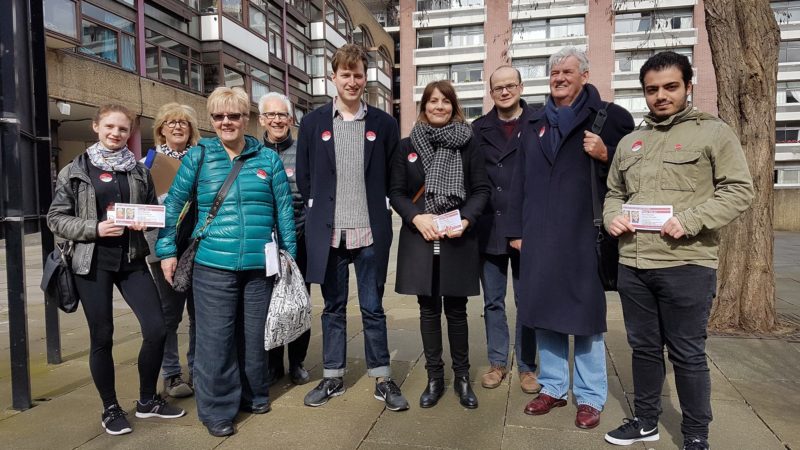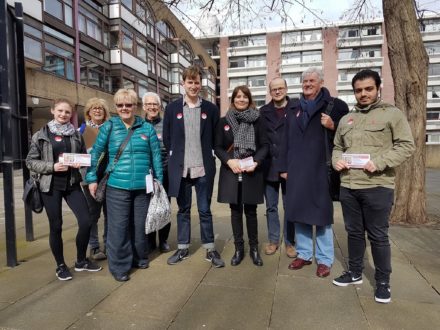

Our new Labour group wishes to see the City of London once again serve the Common Good.
Three years ago I was the first ever Labour councillor to be elected in the City of London. Though stepping down myself late last night, Labour made history once again by winning four additional seats on the Common Council, the governing body in the financial heart of the UK — taking us to a total of five elected councillors and forming the first City Labour group in the history of our party.
Out of 100 seats that were up for grabs this may seem like a tiny proportion. But in fact it’s a huge and historic achievement for Labour — and a great opportunity for those residents of the square mile who have been feeling neglected and forgotten.
As a clergyman it has been a wonderful experience working with the Muslim community, who make up about a third of the electorate in my ward, on issues of shared civic concern. In a week where fanatics have tried once again to drive a wedge between us, it has been a great sign of hope to see Munsur Ali, a British-Bengali film-maker, take up his seat in Guildhall as the first Labour councillor from this corner of the City of London. This has sent a message of hope to the young people in our community that politics is for them too.
So why else was this election so important? The City of London is governed by the oldest municipal authority in continuous existence in the world — the City of London Corporation. Like the mythical beast that guards its gates – the Griffin – it is a strange hybrid; part local authority, part lobby group for the financial services, part institutional articulation of our Ancient Constitution. For example, on the occasion of the death of a reigning monarch the news is formally announced to the nation on the steps of the Royal Exchange, at the tolling of a bell, by the Lord Mayor’s Swordbearer. You get the general idea.
So you can imagine that the Corporation likes to do things in the traditional way. And up until I was elected three years ago, this was to maintain the fiction that it was not politically aligned; that it was “independent”. All councillors, no matter what their political affiliation, came over the hill mob-handed, Independents one and all.
I won’t deny that this has some advantages. It can allow for unlikely bedfellows on particular issues. There’s also no whipping where a self-evident public good is traduced by narrow partisan point scoring.
But I would say that this has caused the City to lose touch with some of its other virtuous traditions; that as a political body it should by definition mediate a balance of interests, rather than exclusively represent a single interest. Indeed, for example, Magna Carta and so many of our liberties were secured by a City of London that actively opposed the domination of absolute power and demanded something nobler.
But over the last generation, some might say it has become complicit in the financial services’ failures and forgotten its original vocation. In my opinion, there is some truth here: it has missed opportunities to take up its role as the critical friend to the institutions of the City and has at times forgotten about its poorest residents in the process.
It is this recognition that opposites need to work together for the Common Good, that underlies the Labour party’s achievement in the wards where it won seats last night.
In my own former ward of Portsoken, individuals of very different backgrounds and interests have come together over the things that matter to them: estate security, problems with repairs, the impact of street pollution on the lives of the children.
For three years we held house meetings in the front rooms of residents who not only hadn’t voted Labour for many years, but saw us as toxic. By helping them rebuild a sense of confidence that they could actually change the little things that upset them, we gave them the power to bring about the changes they wanted to see and overturned their disdain for Labour.
On these and other issues local people found support from City businesses and office workers. In summary, Labour won in the City by combining its traditional voter registration organisation with a community organising strategy that puts relationships first and recognises that politics is first of all about remembering the power we already have together.
This year is actually an important anniversary for the City. It is 950 years since the conquering Norman Duke allowed the City of London to retain the “rights and privileges” that had existed in Saxon times. As the City remembers this story maybe it will realise that our new Labour group also “comes friendly”. It does not wish to see the City abolished. Rather it wishes to see its ancient institutions once again serve the Common Good.
Father William Taylor was the first Labour councilman elected in the City of London and is a parish priest in Hackney.




More from LabourList
Restoration announce recommendations for NEC candidates
‘Factionalism at the top is weakening Labour – and handing a gift to Reform’
‘Europe must stand strong on its own as US security guarantees grow conditional’